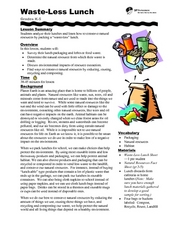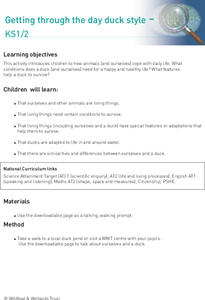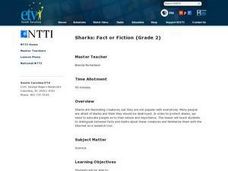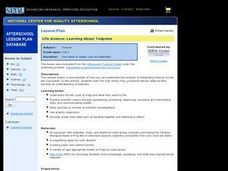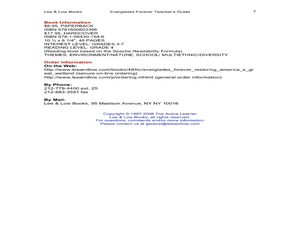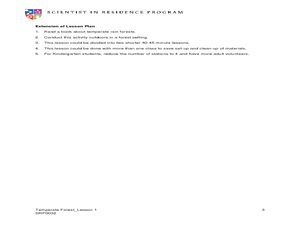SF Environment
Waste-Less Lunch
Is it possible to have a waste-less lunch? Can your class become leaders in conservation? Discuss the importance of reducing waste during lunch time with a fun lesson plan that can be extended to everyday practices. First the class...
Curated OER
Writing Process- Expository Writing
Expository writing is the focus of the language arts lesson plan presented here. In it, young writers review what expository writing is through a class discussion and teacher demonstration. Then, learners write expository text that...
Curated OER
Something's Fishy
Fourth graders identify parts of a fish. In this fish anatomy lesson, 4th graders identify parts of fish in a group setting and then complete a worksheet about the parts of a fish.
Curated OER
Duck
In this ducks worksheet, students read information paragraphs about the habitat, reproduction, feeding and adaptation of ducks. Students study the photograph of the bird. There are no questions to answer here.
Curated OER
Getting Through the Day Duck Style
Students observe ducks at a local wetland. They answer various questions about the ducks behavior and write the answers on a downloadable worksheet.
Curated OER
Basic Needs of Living Things - Lesson One
An interesting way of teaching about basic needs of different organisms awaits your fourth graders. Pupils take part in class discussions and demonstrations which should lead to a greater understanding of how to determine basic needs. As...
Curated OER
Hos Do the Jaguar and Howler Monkeys in Belize Depend on Us?
First graders access the internet and use the sites provided to research Belize, and in particular, the Howler Monkey and Jaguar. Students participate in activities/centers utilizing the information they discovered.
Michigan State University
May I Take Your Order?
If you're a pest, come and get a tasty meal here! Scholars work collaboratively to construct a mini restaurant out of a shoe box and create a menu that feeds a pest their favorite food.
Curated OER
Survival Strategies and Adaptation in Insects
Third graders investigate insects and their adaptations that help them survive. In this survival strategies instructional activity, 3rd graders view photographs of insects and discuss the adaptations that each one uses to survive,...
Aiken County Public Schools
Claymation in the Classroom
Students design an appropriate and usable storyboard and then create a claymation video. They take digital photographs frame by frame, then assemble the stop-motion movie using video software.
Curated OER
Rivers Through Time
Students read or have the book A River Ran Wild read to them. They discuss and reflect on the messages presented in the book. Students use their listening comprehension skills to draw conclusions. Students articulate several examples of...
Curated OER
Alphabetical Autobiography PowerPoint
Sixth graders produce an autobiography, They complete a PowerPoint including one graphic image on each slide, and a subtle or moderate animation. They include 26 slides for each letter of the alphabet, use note pages to present...
Curated OER
Elephants
Students study elephants and the features they have that help to keep them cool. In this elephants lesson students research a feature of the elephant.
Curated OER
Sharks: Scavenging Stomachs
Students examine the role played by sharks in the marine food chain. They conduct a scavenger hunt collecting items that have actually been removed from the stomachs of sharks, and create a display that includes the items and newspaper...
Curated OER
Sharks: Fact or Fiction
Second graders discover the truth about sharks. For this shark lesson, 2nd graders use different resources to help distinguish between fact and fiction with what they have heard about sharks. They complete an attached activity sheet.
Curated OER
Problem Based Learning Scenario
Students research about the function of MPA's. In this marine science lesson, students explore how humans influence changes near these areas. They explore different MPA's in the Great Lakes region.
Curated OER
Life Science- Learning About Tadpoles
Learners investigate a frog's life cycle. In this tadpole lesson, students observe tadpoles in an aquarium and record results. Learners fill in a KWL chart as an assessment.
Curated OER
Clay Ants: Insect Anatomy
Students examine anatomic structures in order to identify insects from other living organisms. They gain a level of comfort from anxiety when observing and handling live and pinned insects. They create clay models of an insect.
Curated OER
Web of Life Game: Trout
Students explore the concept of food webs. In this food web lesson, students demonstarte the connection between species. Students use a ball of string show how the food web works, then have a class discussion.
Curated OER
Everglades Forever
Learners complete pre reading, writing, during reading, and interdisciplinary activities for the book Everglades Forever. For this reading lesson plan, students complete journal entries, answer short answer questions, have discussions,...
Curated OER
Our Own City
Students will construct their own functioning city. Each day students will add to the city requiring adjustments and planning. They solve problems caused by increase in human settlement such as stacking houses creating apartments so that...
Curated OER
Exploring Forest Objects
Students explore the forest. In this ecosystems lesson, students rotate through sensory activity centers, brainstorm, and read about temperate forests.
Curated OER
Monk Seal Research Expedition
Students study data. In this seal research instructional activity, students act as scientific researchers observing Monk seals in their habitat. They work in small groups to record data from a video and when through they share a piece of...
Curated OER
The Conscription Crises
Students explore roles played by Canada's prime ministers The Right Honorable Sir Wilfrid Laurier and The Right Honorable iam Lyon Mackenzie King with regards to the conscription crises of World War I and World War II.


